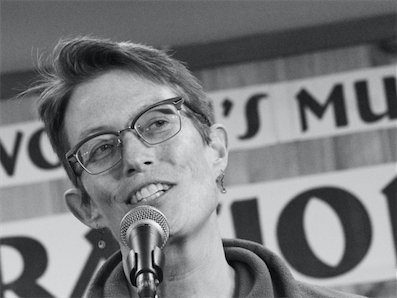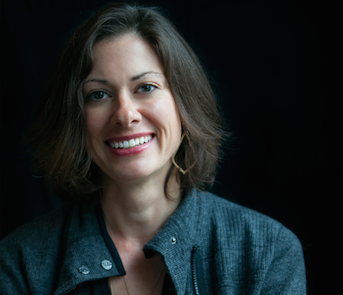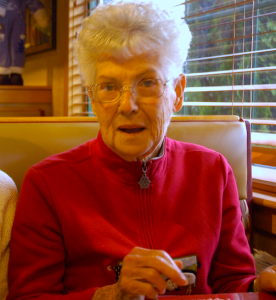Sarah Cypher's Blog, page 2
April 10, 2017
Book review: “Running” by Cara Hoffman
Running by Cara Hoffman My rating: 5 of 5 stars If you aren’t reading Cara Hoffman’s fiction right now, you’re missing out on some important writing. Her vision is demanding. She writes about broken systems (the patriarchy, America itself, and in Running, broken families). Her characters are people who live in the cracks–assault survivors, veterans, ... Read More »
The post Book review: “Running” by Cara Hoffman appeared first on Sarah Cypher.
March 6, 2017
MFA, baby!!
I'm thrilled to announce that I have been accepted into Warren Wilson College's low-residency MFA program and will begin classes this summer. The program is four semesters, and I will continue to run my business without interruption. I look forward to seeing my own work grow for the first time in a long time, and to sharing the fruits of my experiences in the program with my clients in the upcoming years.
The post MFA, baby!! appeared first on Sarah Cypher.
March 3, 2017
March 14: Renee Macalino Rutledge launches THE HOUR OF DAYDREAMS
Progress by Retreat: Three Kinds of Writing Success
February 1, 2017
Review: Strangers in Their Own Land, by Arlie Russell Hochschild
 Strangers in Their Own Land: Anger and Mourning on the American Right by Arlie Russell Hochschild
Strangers in Their Own Land: Anger and Mourning on the American Right by Arlie Russell Hochschild
My rating: 5 of 5 stars
As Senate hearings for Scott Pruitt begin today, I wish I could put this book in every person’s hands. I am a Rust Belt native who was raised with a profound respect for the environment, and learned natural stewardship from my father: a hunter whose family roots trace back to the days before the American Revolution, when Western Pennsylvania was the old frontier. This book, written by a UC Berkeley sociologist, is both a remarkable bipartisan olive branch and a terrible warning of what happens when industry and politics work together to manipulate the American voter’s skepticism of the government.
Through personal interview and careful research, Arlie Russell Hochschild dissects EPA skepticism. Her years-long study focuses on southwestern Louisiana, both the most conservative and the most polluted area of the nation. She locates residents’ resentment of federal regulation in a combination of deliberate political messaging and, more important, in a long history of political quid pro quo between oil companies and the state government, which left EPA regulations toothless. Although federal regulations were put in place to penalize oil companies for decades of flagrant pollution–which had annihilated the region’s bayous–the state’s attitude toward these regulations created a pattern of unfair enforcement. Broadly, the state government made campaign promises in exchange for donations, and then recklessly granted drilling permits. Big Oil was shielded from meaningful penalties while the environmental regulations that were enforced affected only individuals (e.g., fines for illegal game fishing).
Ultimately, Hochschild explores what she calls the Great Paradox, the tendency of Tea Party members to vote against their interests. It’s not all ignorance, as many on the left believe. For example, she records Harold Areno, a Tea Party member and lifelong Cajun who knows exactly who to blame for the devastation of his childhood landscape: “I remember sitting under the cypress for shade in the heat of the summer. The moss hanging on it was green then. Frogs could breathe and they could find all kinds of minnows. Then industry came in. It began to stink so bad you had to leave the windows down on hot nights. It killed the cypress and grass from here clear out to the Gulf. And you still can’t eat the fish or drink the water. … Floating bits of rubber would clog the water pump on your motorboat. We were downstream from Firestone.”
Will this story be echoed around the country? From a 37-acre sinkhole to the ruinous consequences for Louisiana’s fishing and tourism industries, political quid pro quo has irreversible costs. Hochschild is no doomsayer; she reinforces that EPA regulations can and do work if enforced, and presents an economic case that the choice to regulate a polluting industry is not the death knell to a region’s economy: it is not, in fact, an either-or decision. Right now, we stand with one foot already over the line of irreversible climate damage, and yet see the nomination of cabinet members whose interests all interlock in a protective wall around the oil industry.
October 14, 2016
What I’m Reading: Chloe Caldwell’s new essay collection
 I’ll Tell You in Person by Chloe Caldwell
I’ll Tell You in Person by Chloe Caldwell
My rating: 4 of 5 stars
Funny, edgy, and introspective, Chloe Caldwell finds a natural groove on the self-reflective side of confessional essay writing. She creates herself as a character caught between 20 and 30: a rocky stretch of years complicated by addiction, dire financial straits, and uncertainty about the future. Although it’s the kind of book I’d be most likely share with a reader of that age, I really enjoyed Caldwell’s confidence with her form and her intimate, exquisite observations of friendship.
She reads at San Francisco’s Green Apple Books on December 12, and I’ll be there! Website.
August 16, 2016
I’m teaching a class with Kate Gray! Bring yourself and your query letter.
Agents and editors want to discover authors who write with a “fresh voice.” But what does that actually mean, and how do you add that secret ingredient to your query letter and manuscript?
Join us for an interactive, high-energy three hours on Saturday, Sept. 24 at Oakland’s Impact Hub (2323 Broadway), and grab the attention of your readers and industry pros. Sarah Cypher, an independent editor at The Threepenny Editor, and Kate Gray, writing coach and author of the acclaimed novel Carry the Sky, will show you what makes good query letters and first pages pop. In this energetic, interactive workshop, you’ll develop your query letter with tools we offer and identify your distinct voice: the sound that sets you apart from the rest.
Your $125 entry fee to this query letter class includes a copy of Kate’s novel, Carry the Sky, and Sarah’s The Editor’s Lexicon: Essential Writing Terms for Novelists.
Limited to 15 participants. Register now via Eventbrite! Seats will fill up fast.
About the Instructors:

Kate Gray’s passion is being a teacher, a writing coach, and a volunteer writing facilitator with women inmates and women veterans. She is the author of three poetry collections, and her first novel, Carry the Sky (Forest Avenue, 2014), stares down bullying without blinking. In Any More, Black Shoe, her novel-in-progress set in 1953, Sylvia Plath and Maureen Buckley, the younger sister of William F. Buckley, Jr., step into and out of roles prescribed by race, class, gender and religion. Kate and her partner live in a purple house in Portland, Oregon with Rafi and Wasco, their two very patient dogs.

Sarah Cypher has edited New York Times bestsellers and helped clients on their way to deals with Big Five publishers, foreign publishers, and production companies. Self-published clients have generously funded their books on Kickstarter, and earned a monthly income from their sales. She holds a B.A. in Creative Writing, Phi Beta Kappa, from Carnegie Mellon University, and her own writing has appeared in Crab Orchard Review, The Oregonian, Fodor’s, Salon.com, and Publishers Weekly. By being a working writer *and* editor, she offers a savvy look at query letters, concept development, and marketability. She lives in West Oakland with her wife, cat, and two dogs.
Register now via Eventbrite!
January 22, 2016
Schedule: BinderCon LA, March 19-20
I was overjoyed to learn that I’m a scholarship recipient for the next BinderCon, a professional development conference to empower women and gender non‑conforming writers with tools, connections, and strategies to advance their careers. This has been a hugely supportive group of women, I loved BinderCon NYC last autumn, and I can’t wait to meet more of these powerhouse writers in person and share experiences.
What: BinderCon, hosted by Out of the Binders
When: March 19–20, 2016
Where: UCLA, Los Angeles
See you there!
January 21, 2016
Holy objects
My grandmother, Millie Kanaan, wasn’t big on giving gifts. She kept a wad of cash in a bathrobe pocket, and crinkled fives and tens made their way into our hands for birthdays, departures, holidays. She bought us sweets, or sent us home with fushettes–fried Syrian bread dough and homemade chocolate icing. Five years ago, she gave me one of her rings and made sure it fit: I’ve worn it every moment since, except when swimming in open water. It wasn’t the first time she talked about dying, but it was the first and only gift she gave me for the purpose of remembering her when she was gone.
And now that she is gone–her body, her house, a whole material universe of her presence in the world–I found myself drawn to mementos not of her, but of her mementos of others; basically, memories of memories, symbols of people and places sixty years removed. What I don’t know or didn’t ask makes me sad. This feeling of regret over lost history is probably, largely, a universal one. (I hope it is, because even shared grief is lonely enough.) But I like to think of her using these objects, looking at them, thinking about someone she loved or missed or about a place beyond the pink-carpeted rooms of her old age.
The family ring, seven small diamonds to represent my grandparents and their five children;
Her father’s rosary and its tin box, shaped like a bible;
Her red Orthodox prayer book, with her husband’s obituary card in the back cover;
Her husband’s WWII Army Air Corps unit photograph;
A Heinz pickle pin (small and green, a cheerful object to Pittsburgh natives);
Carved wooden giraffe, a gift from her son-in-law after his trip to Ghana;
The smaller pair of binoculars, used for birdwatching and deer-watching from her kitchen window;
Plastic wall clock, which ticked loudly in her room in the nursing home.
The last isn’t sentimental. But it was one of the first and last things she looked at every day for her final year. Among other assets, my grandmother was a punctual and practical woman. And really, at the heart of all these mementos, is time: shared, lost, turned back, erased, treasured, limited.
Obituary, Millie Kanaan (January 29, 1924–January 15, 2016)

December 21, 2015
Maybe Merry
As the year ends, it’s easy to focus on the ways in which this holiday season could be better. The health of grandmothers is too present: mine and her sadness in the face of her first major holiday in a nursing home; my wife’s grandmother on hospice; the neighbor’s who passed away suddenly two days ago, which I learned when I opened the front door to a street full of Oakland Police cruisers. A dear friend recently lost her grandmother, too.
These are the women who created Christmas literally from the sugar in their kitchens and the yarn in their hands. As I hang three of my grandma’s treasured hand-blown-glass icicles on our tree, our own plans are fragile as a skiff of ice–rushed between work projects and the likelihood of an emergency bereavement flight to Texas.
I’m thankful for so many things, though–my wife, my family, my work, my job, my health. That these blessings are obvious to me makes them feel even more like dumb luck. But I had to prod myself to remember these last night as I cleaned a litter box in the rain. I couldn’t think of a worse, more angering chore to conduct at 10 p.m. under a broken porch light–especially after having just spent four bone-chilling hours in an outdoor pool for a swim class. Erin had gone to bed, my work was overwhelming me, and I couldn’t stop sneezing. Under these conditions, it’s difficult to grasp what’s actually, specifically good about obvious blessings, so I focused on one other thing I have always been grateful for:
I was thankful for having an appetite.
My history with food is long, warm, and undiscriminating. I came inside, dried the rain off my hair and sweatshirt, and poured the rest of the leftover chili over rice. I ate two pieces of cornbread while it heated up. I opened a beer. I finished the chili and beer and made hot chocolate, pausing just to feed some marshmallows to the dog. Then I ate the leftover tortellini and meat sauce and took a dessert of dark chocolate to the couch. This is normal enough. This is how I feel happy and taken-care-of in the depths of any dark mood or piece of ambivalent holiday news.
In my family, food is love. My grandmother learned to cook from her mother-in-law, a widow from Lebanon, and when we cousins were children she would bring us a sample of whatever she was cooking: a little thumb-sized lump of food in a napkin that she called a “mouse.”
My favorite kind of mouse was kibbeh niyeh–raw lamb with bulgur wheat, salted and served cold. Its flavor was mineral and oddly refreshing. But I loved any sort of food she gave us, and it was easy to do partly because she made the best stuffed grape leaves on this side of the Mediterranean, and mostly because it was the one time she didn’t mind us gathering around the kitchen doorway with our appetites and bad jokes and bottomless hunger for her attention. She never refused a hug, and whenever I went home, she always dropped whatever she was doing and stood in her driveway, hand on her hip, and waved goodbye to the car until she couldn’t see it anymore.
Last night, satiated and growing warmer, I sat on the couch in a room lit only by my computer screen and the Christmas tree. I let the calico cat pick over the crumbs on my plate. (I forgive this animal too quickly, Erin says.) The glass icicles refracted the colored lights. I missed my grandmother–she’s still alive and I saw her last week, but she is 92 and in wobbly health, and I only see her twice a year. Christmas is a milestone that looks further away every time.
“I’ll see you in May,” I told her.
“It’s too long.”
“I’ll talk to you on the phone a lot between now and then.”
Still, she’d labored up from her chair and set aside the pork loin and grape leaves I’d brought her, and walked me all the way to the front door of the nursing home. She clomped her walker over the doorframe and struggled out to the porch. Erin and I drove around the roundabout and tooted the horn, and she stepped away from her walker long enough to wave goodbye. When I checked the rearview mirror, she was still waving.
Holidays or not, this is my grandmother’s tacit wisdom: the equivalence of food and affection. You feed someone if you love them. If you love them, you feed them. It’s no wonder that the first gift I ever gave Erin was a container of homemade chicken noodle soup.
So, here’s my wish. May you always have someone to feed, and someone to feed you.




